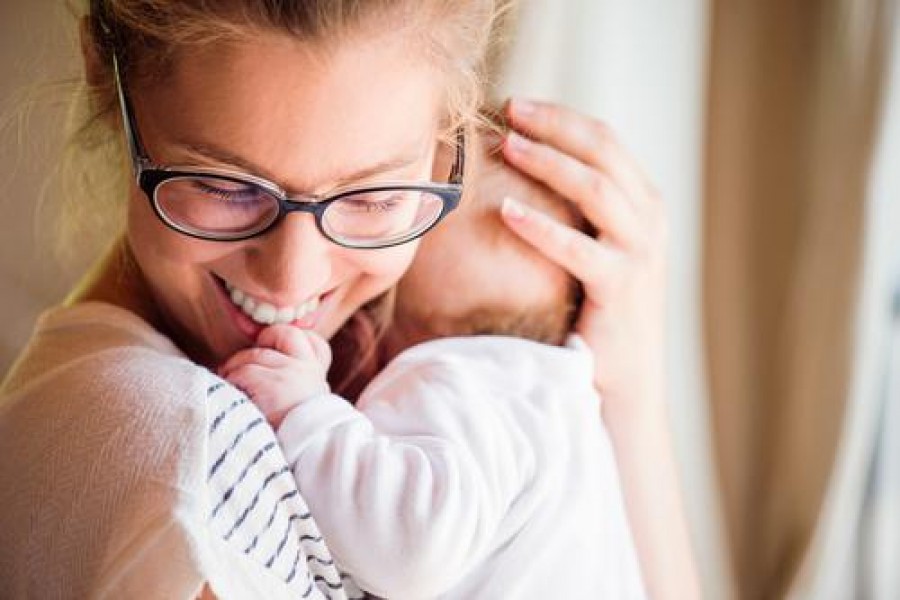Baby Bonding and Attachment: What’s the Difference

When it comes to you and your baby, there’s no greater feeling of love. From the moment your baby is placed in your arms, you’ll most likely feel a deep emotional connection between the two of you.
It’s a special and unique feeling, and there are many different words used to describe it. You’ll most likely hear your doctor or midwife referring to this feeling as ‘attachment’ or ‘bonding’. It used to be a universal convention in hospitals everywhere that mums and babies were supposed to get straight down to ‘bonding’ after labour! Nowadays the medical professionals are a bit more relaxed, and know that sometimes mothers and parents need time to build up a strong bond with their baby.
There is heaps written about attachment theory, the different types of attachment, and potential ways that types of attachment develop based on a wide range of factors. It can all seem a bit confusing.
Some new parents find these concepts daunting and it can be a real source of anxiety, worrying that you’re not forming a ‘healthy attachment’ or ‘bonding properly’ with your baby. These are all perfectly normal feelings, nearly every new parent goes through it and it’s important to know that you’re not alone in the way you’re feeling.
The idea of attachment and bonding should not be a source of stress or make you feel like you’re a bad parent – they’re simply useful terms to understand what you and your baby are feeling, and how your relationship is developing together.
Below we take a closer look at what the main difference is between attachment and bonding, to give you a little insight and reassurance.
Attachment
What is ‘attachment’?
The idea of attachment has a bit more of a broader meaning in terms of parenting psychology compared to bonding. It’s more about how the ways you interact with your baby in the early stages, impacts on the further development of your relationship with them. It’s about both you and your baby and understanding how your baby picks up on even the most subtle ways you interact with them.
A ‘healthy’ attachment is one that works for you and your baby. As a mother, you are your baby’s primary caregiver, they rely on you for everything – both their physical and emotional needs. It is not unusual for your baby to test how you respond to them – and it’s how you react to them that determines the development of your attachment relationship.
What can I do to help build a healthy ‘attachment’?
This is all about providing reassurance to your baby that you understand their needs, and you are responsive to them. That doesn’t always mean responding in a split second every time they start crying, you want to make sure you help them develop strong emotional dependence and other social skills such as independence, patience, self reliance etc.
It’s about providing all the things they need from birth – food, cuddles, play, interaction – to help show them that you’re there for them and they can feel secure in your love for them. You can then build on this together over time, and this relationship will develop as both you and your baby mature into your relationship together.
Bonding
What is ‘bonding’?
Bonding is a word that can be used to describe a slightly different feeling and concept to attachment. It’s more related to you as the parent and primary care giver, and the feelings you have towards and about your baby.
The emotional feeling of love, care, tenderness and kindness you feel towards your baby can often feel overwhelming at times – especially in the early days immediately after birth. Some mothers report these intense feelings during their pregnancy – some on finding out they’re pregnant, some when they see the first scans of their baby. Other new parents find it can take a little longer for these feelings to really develop – and that’s okay too. Every parent is different.
What can I do to bond with my baby?
As mentioned above, bonding can be a cause of anxiety for some parents – while some may step into the role like a duck to water, some parents find the transition a little trickier. Seeing other parents apparently so well bonded and understanding of their baby can make a new parent who’s struggling feel even worse.
Bonding is not a competition and it’s okay to feel a bit lost at first. Pregnancy hormones are powerful and confusing, both pre and post birth so don’t be too hard on yourself if you have off days. What’s most important is spending quality time with your baby, learning about them, how they respond to you, learning about how they cry and when, so you can build a better understanding of them and a strong foundation from which to continue building your bonding relationship with them. This helps to demonstrate to your baby that they are loved, and you’re able to respond to their needs.
When should I be worried about attachment and bonding with my baby?
It’s not uncommon for many women to experience post-natal blues, and feel a bit down after birth but post natal depression is serious can have a real impact on how you first interact with your baby and experience motherhood.
If you’re really struggling to understand your baby’s needs, feel disengaged, uninterested or resentful towards your baby, make sure you have conversation with your doctor or midwife. Often talking about what you’re experiencing can really help put you on a more positive path as your midwife, loved ones and close friends rally to support you and help you work towards a more positive space.
Attachment and bonding, although perhaps slightly different, are both ideas that come from the same place – building a positive relationship with your baby. One impacts the other and vice versa.
What’s most important is that you feel love, care and nurture towards your baby – you won’t always get it right every single time, but if those three things are at the heart of everything you do with your baby, you’ll be more than okay.



